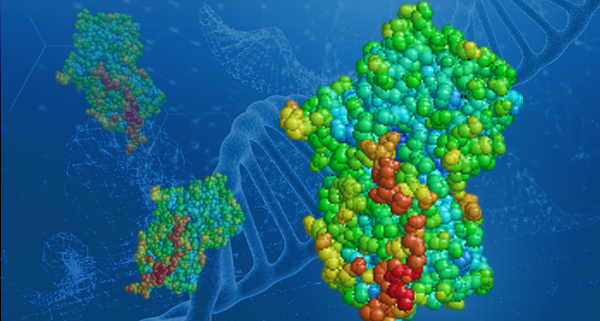News from QED Bioscience
Alpha-1-Antitrypsin Deficiency and Autoimmune Disease
Alpha-1-Antitrypsin (AAT) is a serine proteinase inhibitor (SERPIN) that in humans is encoded for by the SERPINA1 gene and is synthesized primarily by hepatocytes. The primary function of AAT is to protect normal body tissue from damage by nonspecific neutrophil proteolytic enzymes, such as neutrophil elastase which can attack lung elastin and compromise bronchial and alveolar wall integrity. Numerous mutations of the SERPINA1 gene have been identified, and many of these result in AAT deficiency; the most common mutation associated with AAT deficiency is a single base-pair substitution of lysine for glutamate at position 342. This mutation causes ~70% of AAT to be degraded in the liver and ~15-20% to be misfolded1. As a result, levels of circulating AAT are severely reduced and frequently lead to cases of pulmonary emphysema. Infusions of AAT provide protection against proteases in the lung, and advances in treatment protocols continue to be made.
Although most commonly associated with lung disease, AAT deficiency is also associated with autoimmune and inflammatory diseases for which AAT therapy has shown promising results. Examples of this are Type 1 Diabetes, Rheumatoid Arthritis, and Systemic Lupus Erythematosus2:
Alpha-1-Antitrypsin for Type 1 Diabetes (T1D)
Insulin insufficiency characteristic of T1D is due to autoimmune destruction of insulin-producing pancreatic beta cells. T cell-driven autoimmunity and inflammatory factors contribute to the disease, and impaired AAT activity in T1D patients has been observed. Using the non-obese diabetic (NOD) mouse model, investigators tested AAT gene therapy and found 70% of treated NOD mice remained diabetes-free for 8 months. Direct treatment with clinical grade AAT also prevented or reversed diabetes in NOD mice. Based on these preclinical studies, preliminary human trials of AAT treatment have been conducted and demonstrated that AAT was safe and well-tolerated in patients with new onset T1D. Dose optimization studies are in progress.
A fascinating spin-off of these studies came from testing AAT as an anti-rejection agent in islet cell transplantation studies. Allogeneic transplantation of islet cells has been considered as a treatment for T1D, but rejection of transplanted cells has remained a challenge. Given the anti-inflammatory effects of AAT, it was evaluated in combination with islet transplantation in mouse models, and AAT treatment significantly prolonged islet allograft survival. Future studies will likely examine whether AAT treatment can be used as an anti-rejection agent for other organ transplantations.
Alpha-1-Antitrypsin for Rheumatoid Arthritis (RA)
Rheumatoid arthritis is a systemic autoimmune disease characterized by chronic joint inflammation and destruction. The target(s) of RA-associated autoantibodies appear to be citrullinated proteins. Citrulline is an amino acid that is not encoded in the genome, but is instead created by posttranslational modification of arginine residues in proteins, catalyzed by the enzyme peptidyl arginine deiminase (PAD). Many proteins can be citrullinated, including histones, cell surface receptors, and extracellular connective tissue components. Having established the anti-inflammatory effects of AAT, AAT protein and gene therapies have been evaluated for therapeutic efficacy in the type II collagen-induced arthritis mouse model; both types of therapy delayed development of arthritis and joint damage and reduced autoantibody against collagen II suggesting potential for AAT in controlling RA autoimmunity.
Alpha-1-Antitrypsin for Systemic Lupus Erythematosus (SLE)
Systemic lupus erythematosus (SLE) is a devastating autoimmune disease that affects millions of patients (mostly women) worldwide. SLE causes damage to multiple organs including kidney, brain, skin, and heart, and currently there is no cure for SLE. Multiple autoantibody targets have been identified in cases of SLE, including double-stranded DNA (dsDNA), mitochondrial RNA, ribonucleoproteins (Sm/RNP), and Sjögren’s-syndrome-related antigen A and B. These autoantibodies have also been identified in other inflammatory conditions.
Dendritic cells and type 1 interferon appear to have critical functions in the onset and maintenance of SLE. Shapria et al.3 tested a C-terminal fragment of AAT in MRL/lpr mice (a spontaneous lupus mouse model) and found that levels of autoantibodies against dsDNA, IL-17, and IL-12 were reduced. In a similar study4, treatment with full-length AAT inhibited dendritic cell maturation in mouse bone marrow as well as secretion of TNF-α, IL-1β, and type 1 interferon. The treatment also reduced serum levels of lupus-specific autoantibodies, anti-dsDNA, and anti-nuclear antibodies and partially reversed lupus nephritis in MRL/lpr mice.
Clearly SLE is a complex disease with an array of autoantibodies at work on different cellular targets at different stages of the disease. Current research suggests potential benefits of AAT in controlling SLE, and future studies will undoubtedly reveal the precise mechanisms by which AAT can help regulate autoantibody production in this disease.
Conclusion
Because AAT is a complex multifunctional protein, it may exert its therapeutic effects through different mechanisms, such as:
- Inhibition of proteinases
- Interaction with mediators of inflammation
- Alteration of gene expression
- Suppression of autoantibody production
- Inhibition of dendritic cell maturation and function
The challenge remains to unravel the various functions of AAT as well as the complexities of autoimmune diseases. More studies are needed in order to confirm the therapeutic potential of AAT, but evidence gathered to date encourages further investigation into which patients suffering from autoimmune diseases can benefit from AAT therapy.
References
- Lomas DA. 2018. Chronic Obstr Pulm Dis 5: 233-243.
- Song S. 2018. Chronic Obstr Pulm Dis 5: 289-301.
- Shapria E et al. 2011. Lupus 20: 463-472.
- Elshikha AS et al. 2016. PLosOne 11: e0156583.


